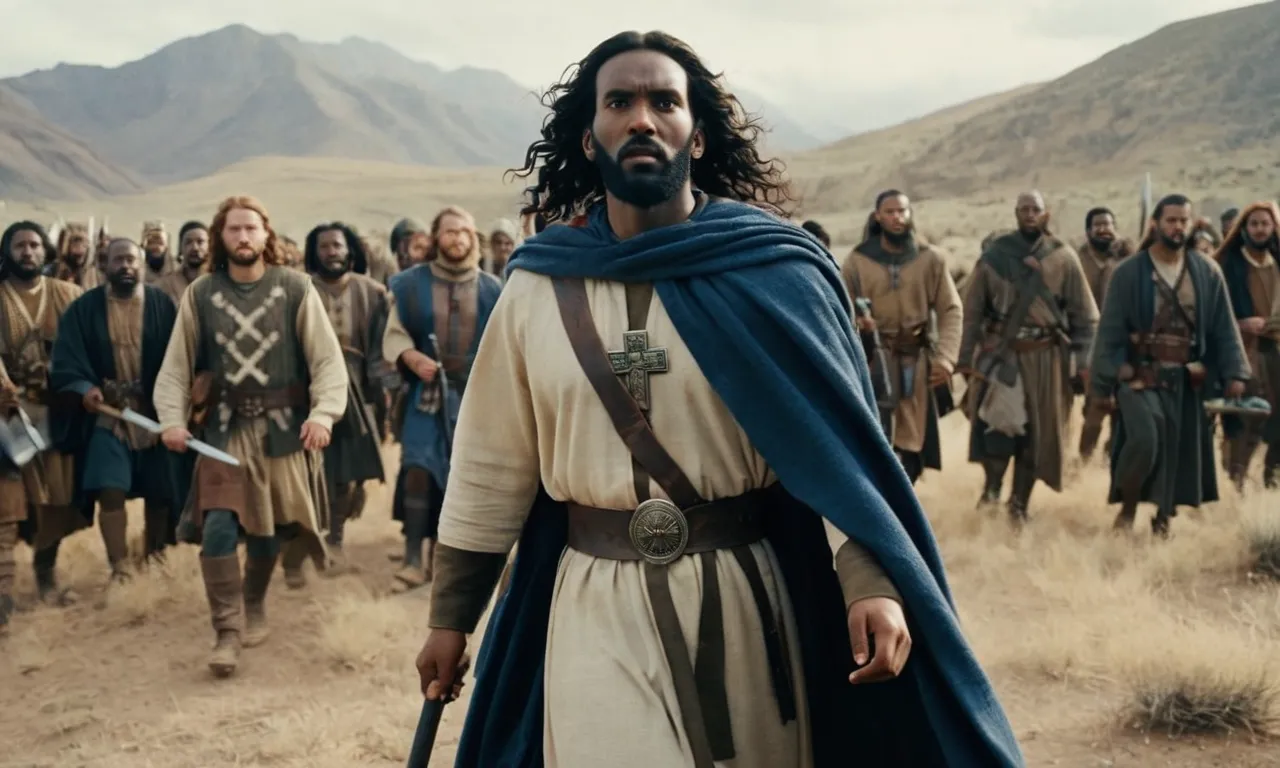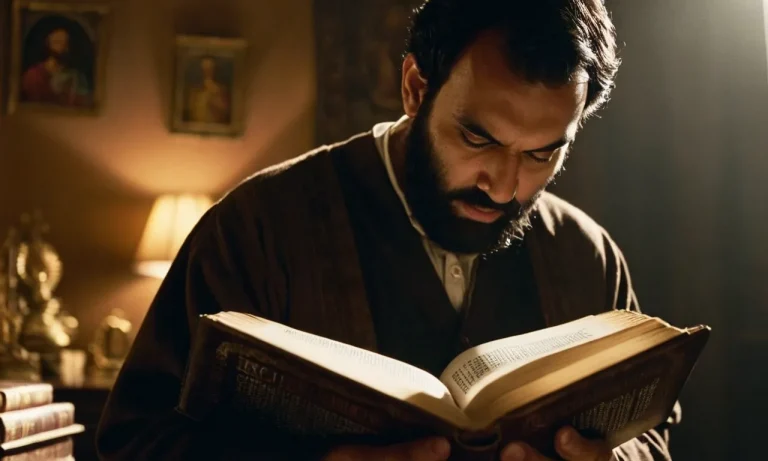Bible Characters Who Stepped Out Of Their Comfort Zone
Stepping out of one’s comfort zone can be daunting, but it is often necessary for growth. This is demonstrated by several biblical figures who were called by God to leave behind what was familiar and safe in order to fulfill His purposes.
If you’re short on time, here’s a quick answer: Key bible characters like Abraham, Moses, Esther, and Paul stepped out of their comfort zones when God called them, leaving behind their regular lives and routines in order to follow His will, even when it was difficult or scary.
Abraham’s Journey of Faith
God’s Call and Abraham’s Obedience
The story begins when God calls upon Abraham (originally named Abram) to leave behind his country, his relatives, and his father’s household to go to a land that God would show him (Genesis 12:1). Remarkably, the biblical text states that “Abram went as the Lord had told him” (Genesis 12:4).
Abraham stepped out in obedience and faith in response to God’s call, leaving behind the familiar and comfortable to embark on a journey into the unknown.
Leaving Behind Family and Homeland
For Abraham to leave his homeland and family behind would have been astonishing and likely frightening. Yet Abraham obeyed God’s call, demonstrating remarkable faith and trust to follow God’s leading and promises: “I will make you into a great nation, and I will bless you; I will make your name great, and you will be a blessing” (Genesis 12:2).
Leaving what was familiar behind was likely an immense challenge, but one Abraham courageously embraced through faith in God’s promises.
Research indicates that migrating to a new land in ancient times would have meant leaving behind critical social support systems. Yet despite this monumental change, Abraham stepped forward in faith. His obedience is an inspirational example of stepping outside one’s comfort zone to follow God’s guidance.
Continued Trust Through Unknown Territory
Abraham’s faith was further tested as he and his family, including his wife Sarah and nephew Lot, traveled hundreds of miles to an unfamiliar land. The author of Hebrews in the New Testament affirms that “by faith Abraham, when called to go to a place he would later receive as his inheritance, obeyed and went, even though he did not know where he was going” (Hebrews 11:8).
Each day and night surely brought new questions and fears, yet Abraham persisted in faith.
Details about precise routes or locations may have been vague for Abraham. Yet specifics did not matter as much as God’s sustaining presence and promises. As the father of faith, Abraham modeled trusting God one step at a time.
His example calls Christ’s followers today to similarly step forward in faith, even into discomfort and uncertainty when the Lord calls and leads.
| Phrase | Synonyms |
|---|---|
| remarkable | astonishing, extraordinary |
| courageously | bravely, fearlessly |
| monumental | momentous, substantial |
Moses Confronting Pharaoh
Moses’ Hesitation and God’s Reassurance
When God first called Moses to lead the Israelites out of Egypt, Moses was hesitant. He said to God, “Who am I that I should go to Pharaoh and bring the Israelites out of Egypt?” (Exodus 3:11). Moses felt inadequate for the task. However, God reassured Moses that He would be with him (Exodus 3:12).
God even allowed Moses’ brother Aaron to speak for him (Exodus 4:14-16). With God’s reassurance, Moses gained the courage to confront Pharaoh.
Standing Up to the Powerful Pharaoh
As the ruler of Egypt, Pharaoh was extremely powerful. Yet Moses boldly stood before Pharaoh to advocate for the oppressed Israelites. When they first met, Moses requested a three-day journey into the wilderness for the Israelites to worship God.
Not only did Pharaoh refuse, but he increased the Israelites’ labor (Exodus 5:1-9). Moses courageously continued appealing to Pharaoh through the 10 plagues, unrelenting in his mission to free his people.
Pharaoh’s magicians tried to mimic God’s miracles, but they eventually conceded, “This is the finger of God” (Exodus 8:19). Still, Pharaoh stubbornly refused to let the Israelites go. His heart was hardened, requiring all 10 plagues before he finally relented.
Moses displayed remarkable courage and faithfulness by confronting the mighty Pharaoh again and again.
Leading the Israelites Out of Captivity
After the 10th plague, Pharaoh told Moses to leave Egypt. The Bible says about 600,000 Israelite men, plus women and children, departed from Egypt (Exodus 12:37). Scholars estimate 2-3 million Israelites left Egypt in the exodus.
As the leader, Moses boldly guided this huge number of people into the wilderness.
But Pharaoh changed his mind and sent his army after the fleeing Israelites. Trapped at the Red Sea, the Israelites were full of fear. Moses demonstrated exemplary courage, declaring, “Do not be afraid.
Stand firm and you will see the deliverance the Lord will bring you today…The Lord will fight for you; you need only to be still” (Exodus 14:13-14). God miraculously parted the Red Sea, allowing the Israelites to safely cross on dry ground.
From a fearful fugitive shepherd to the courageous leader of millions, Moses stepped far out of his comfort zone repeatedly when confronting Pharaoh. His bold obedience to God liberated the Israelites from brutal slavery.
Esther Risking Her Life
Hiding Her Jewish Identity in a Foreign Land
After the exile of the Jews from Jerusalem, Esther found herself living in the foreign land of Persia under King Xerxes’ rule. As a Jew, she faced potential persecution if her background was discovered, so she kept her ethnic identity hidden, going by only her Persian name “Esther” instead of her Hebrew name “Hadassah” (Esther 2:7).
Staying quiet likely conflicted with Esther’s sense of Jewish pride and unity, but she prioritized personal safety by blending in with the Persian majority.
Deciding to Approach the King
Upon learning of a plot to massacre the Jews within the kingdom from her cousin Mordecai, Esther faced a dilemma. She was in a unique position as Queen to approach King Xerxes directly about the imminent threat, but doing so was tremendously dangerous:
- All citizens risked death if approaching the King’s throne room unsummoned (Esther 4:11).
- As a quietly hidden Jew herself, Esther further risked exposure of her ethnic background by advocating for the Jewish people.
However, Mordecai urged Esther that perhaps she had been made Queen for such a time as this
, indicating divine orchestration (Esther 4:14). She told Mordecai to gather the Jews to fast and pray for her for three days while she prepared.
Esther demonstrated that the call of duty and love for her people outweighed all personal risk, resolving if I perish, I perish
(Esther 4:16).
Foiling the Plot Against Her People
Approaching the King unsummoned brought shock from Xerxes, but he extended approval for her to speak by raising his scepter. Esther denounced the man plotting the massacre – Haman – directly to the King’s face (Esther 7:6).
King Xerxes ordered Haman killed instead, authorizing Esther and Mordecai to issue another decree allowing the Jews to defend themselves when the date of attack came (Esther 8). Through Esther’s courageous direct appeal, the attempt to destroy her people was heroically thwarted against incredible odds.
Paul’s Dramatic Conversion
A Venomous Persecutor of Christians
In the beginning, Paul (originally named Saul) was a dedicated and vicious persecutor of early Christians. As a devout Pharisee, he viewed the teachings of Jesus Christ and His followers as dangerous heresy that needed to be stamped out.
Paul heartily approved of the stoning of Stephen, the first Christian martyr, and later obtained authority to imprison believers in Jesus throughout Judea (Acts 8:3).
Breathing threats and murder against Christ’s disciples, Paul went from synagogue to synagogue, trying to make them blaspheme. If he found any belonging to the Way (Christianity), he would bring them back bound to Jerusalem for punishment (Acts 9:1-2).
By his own admission, Paul “persecuted this Way to the death, binding and delivering into prisons both men and women” (Acts 22:4).
Blinded by the Lord on the Road to Damascus
As Paul was approaching Damascus on a mission to arrest more followers of Jesus, suddenly a light from heaven shone around him. Falling to the ground, Paul heard a voice saying, “Saul, Saul, why are you persecuting Me?” (Acts 9:4).
When Paul asked who was speaking, the Lord replied, “I am Jesus, whom you are persecuting” (v.5).
Abruptly blinded by the divine light, Paul was led by the hand into Damascus. For three days he went without sight and did not eat or drink (v.9). The Lord then sent a disciple named Ananias to go lay hands on Saul to regain his sight.
Ananias was afraid since he knew Saul’s reputation for imprisoning believers. But the Lord told him, “Go, for he is a chosen vessel of Mine to bear My name before Gentiles, kings, and the children of Israel” (v.15).
Embracing His New Mission
After Ananias laid hands on him, Paul’s sight was restored. He arose and was baptized, then stayed with the Damascus disciples for several days. Paul immediately began preaching in the synagogues that Jesus is the Son of God (v.20), amazing everyone who heard since they knew his former background.
Paul increased even more in strength and confounded the Jews by proving that Jesus is the Christ (v.22).
When the brethren learned of a plot to kill Paul, they helped him escape from Damascus in a basket through an opening in the city wall (2 Cor. 11:32-33). With his life radically transformed by the Savior, Paul started his new ministry reaching out passionately to Gentiles with the gospel of Christ, eventually gaining the title “Apostle to the Gentiles.”
Paul went from being Christianity’s most dangerous foe to its most influential champion. His dramatic conversion shows the transforming power of Christ which can change anyone willing to follow Him wholeheartedly.
Conclusion
As we have seen through the journeys of Abraham, Moses, Esther, and Paul, stepping out of comfort zones requires courage, perseverance through difficulty, and complete trust in God’s leading. Their examples remind us that following God’s call often leads us to unknown places that can powerfully transform us as well as others around us for His glory.








